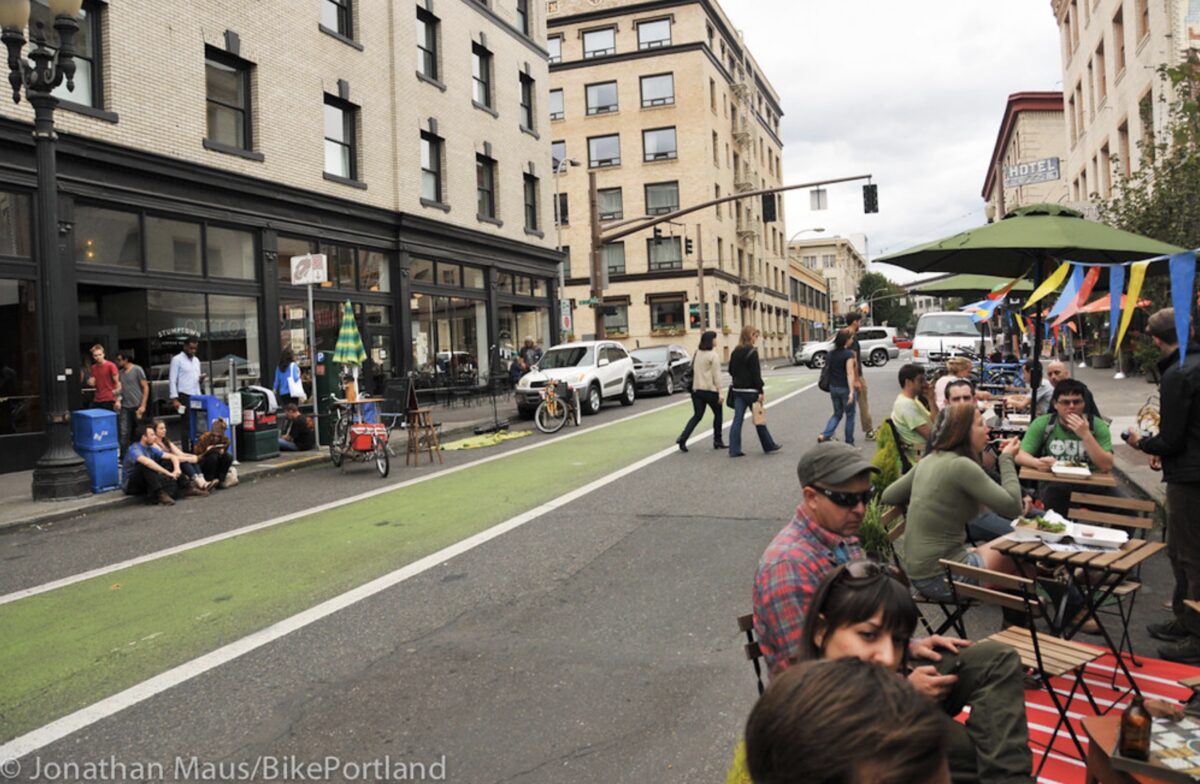
“I believe life will be radically different post-Covid and our planning should reflect our new reality.”
— Jo Ann Hardesty, city commissioner
At a city council work session Thursday, Portland Mayor Ted Wheeler and the four other commissioners had an informal and wide-ranging discussion about how to respond to the multiple crises facing our city. During the meeting, Commissioner Jo Ann Hardesty described how she wants to use her leadership of the transportation bureau to kickstart the local economy and face the climate crisis. Hardesty called it a vision for “smart transit”.
The work session was led by Dr. Markisha Smith from the Portland Office of Equity and Human Rights. Each commissioner was asked to share their opinion about the most urgent issues council should focus on in the next 12-18 months.
The first thing Hardesty mentioned was her vision for more carfree streets we reported on earlier this month. Hardesty elaborated on that idea (first shared her policy director Derek Bradley at a Bicycle Advisory Committee January 12th), but she didn’t stop there.
About one hour and 15 minutes into the two-hour session (you can watch it here), Hardesty laid out four transportation-related goals.
Advertisement
She tied a vision for carfree streets downtown to the climate crisis, economic rebirth and changing behaviors related to the Covid pandemic:

(Photo: J. Maus/BikePortland)
“When I think about smart transit I think about, as we are attempting to reach our climate goals, are there opportunities to support small restaurants across the city by closing off some streets to auto traffic? Is it possible when we are in rebuild mode coming out of Covid, to really think about what would a carfree downtown look like? I say this because I think that there is this misperception that one day we’re going to go back to business as usual and that Covid will be behind us, and we’re going to flip the switch and life will be as it was prior to Covid. I think that there’s a lot of people that believe that and I am not one of them. I believe life will be radically different post-Covid, and our planning should reflect our new reality… Is there an opportunity to create international districts in different parts of the city that people can access for food and goods and services that are not tied to people getting into automobiles?”
Hardesty then mentioned her desire to boost electric vehicle access:
“I also want to think about how we create opportunities for electric vehicle infrastructure in different parts of the city so that we can ensure that BIPOC community members have access to both building it and actually being able to take advantage of using it.”
Her next two goals were related to funding. The first was about federal funds:
“I want to make sure we are identifying federal resources that traditionally have been all about freeway expansions. I’m looking for federal resources to support a climate resilient transportation department that is really focused on green issues as compared to freeway expansions like we’re so accustomed to.”
The second was the concern that PBOT’s budget is closely tied to driving and there’s still no substitute to gas taxes and parking-related revenues — both of which were trending down before the pandemic hit:
“[I am interested in] trying to identify new funding opportunities to create a smart transit system for PBOT that is not dependent on people driving automobiles, and not dependent on people parking at parking garages [PBOT owns and operates several of them downtown]. We are facing a $40 million budget deficit because normal funding mechanisms have been impacted by A) Covid and B) should be impacted by our climate justice and resiliency goals.”
The facilitator then asked other commissioners to respond.
Advertisement
Commissioner Mingus Mapps said, “I generally support this vision. I think it’s innovative and I’m happy to work with a lot of these things.”
Commissioner Carmen Rubio said, “I also support it. It’s in line with a lot of our goals, particularly around equity.”
Commissioner Dan Ryan was much less enthusiastic: “It felt very connected to the climate crisis, even though it was stated as transportation. But that’s what I kept hearing. It’s not in my top three or four, but I respect what I just heard.”
Mayor Wheeler responded with, “I appreciated it. It sounded more like the answer to a broader question. It sounded tactical. I think it is in alignment with our stated goals around climate action and transportation equity. But I would see that as one of multiple strategies that are fulfilling the larger objective.” Then he added, “I want to say this: I actually love innovative and visionary thinking and I appreciate that. It’s a good vision.”
With new leadership in City Hall and multiple crises facing Portland, now is a great time for a new transportation vision and more urgency on the topic in general — something Portland hasn’t for years. Hardesty seems to understand the opportunity and appears to be unafraid to try and meet it. As she laid out her idea to use streets as gathering places in a way that would help our economy rebound in a Covid-safe way, Hardesty said, “That’s one of the exciting things about having transportation at this moment.”
— Jonathan Maus: (503) 706-8804, @jonathan_maus on Twitter and jonathan@bikeportland.org
— Get our headlines delivered to your inbox.
— Support this independent community media outlet with a one-time contribution or monthly subscription.
